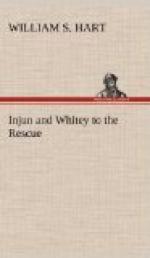“I’m sorry my saddles won’t fit him,” said Chet, “but you’ll find sittin’ on this blanket as comf’tbul as your mother’s rockin’-chair, an’ you’ve only sixty mile t’ go.”
“Sixty miles!” gasped Whitey.
“Thassall. Now you keep t’ that road, with them hills t’ your right, an’ when you get t’—”
Chet described at length Whitey’s route to the Star Circle Ranch. Sadly Whitey mounted Felix and set forth. Again the road proved little but a grass-grown wagon track through the rolling plain edged by the gray hills. And soon it seemed to Whitey that Chet had been over-enthusiastic when he said that Felix’s back was easy as a rocking-chair. At first it might have seemed so, but after awhile it felt more like a rail fence.
And Whitey discovered peculiar traits in Felix. He constantly wanted to turn to the right, and had to be pulled back, and he was cold-jawed. And once in a while he would stop short, and when Whitey urged him on, would start in a despondent way, with his head down and his ears flopping, and would have to be kicked or whipped to be urged to do anything faster than a walk. It was all very discouraging.
Perhaps you never have seen a horse or a jack attached to the end of the pole of one of those old stone grinding-mills, around which he marches and marches, while the grain is ground between the whirling stones in the center. That was Felix’s regular job, which accounted for many of his peculiarities—but Whitey never knew about it.
Among the interesting things about animals is their sense of time. Many of them seem to be as accurate as clocks and some of them as useful as calendars. One dog, in particular, comes to my mind, whom his master used to bathe on Sundays. And when this custom was firmly fixed in his—the pup’s—mind, he would go away on Friday night and stay away till Monday morning. He got to be the dirtiest dog in town.
And the easiest time for an animal to tell is the time to stop work and eat. Felix was very clever in that regard. At about six o’clock the unsuspecting Whitey dismounted to stretch himself and ease the strain of jouncing up and down on that rocking-chair that had come to feel like a ridge-pole. Naturally his eyes turned away from Felix, to whom he was beginning to take a personal dislike.
Whitey’s eyes were brought back with a jerk by the soft thud of little hoofs on the prairie, for Felix was beating it back toward Willer Bend, with a speed that astonished his late rider. Whitey started after him instinctively, but he soon realized that that was useless, and he stood and watched, while Felix became a blurred spot in the distance. Whitey didn’t know that it was time to quit for the day at the grinding-mill—and it would not have done him any good if he had.
But he knew that it was lonely on the prairie. And that he had come only about a third of the way to the Star Circle Ranch. So he supposed he must be in for another walk, for he wouldn’t go back to Willer Bend for that Felix, not if he died for it. He started determinedly on his course. He might meet some one who would give him a lift. Anyway, it was going to be a moonlight night, and wouldn’t be so bad; and walking wasn’t much slower than riding Felix, and was far more comfortable.




